General Psychology lectures 14 -15 Stress and adjustment.

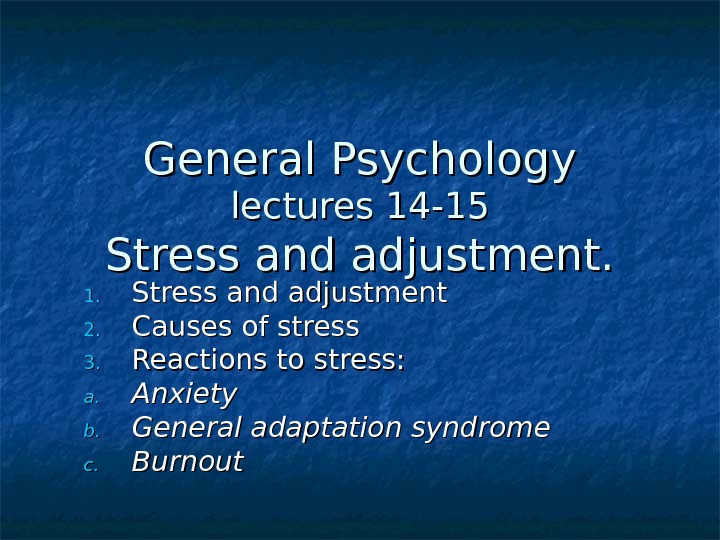
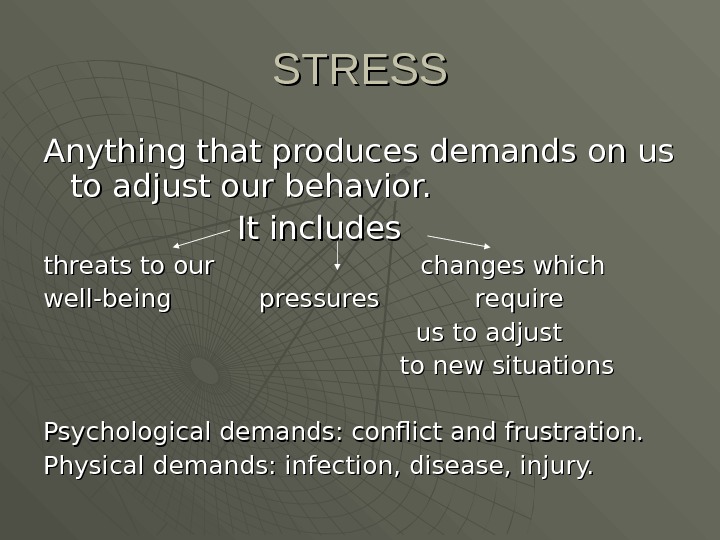
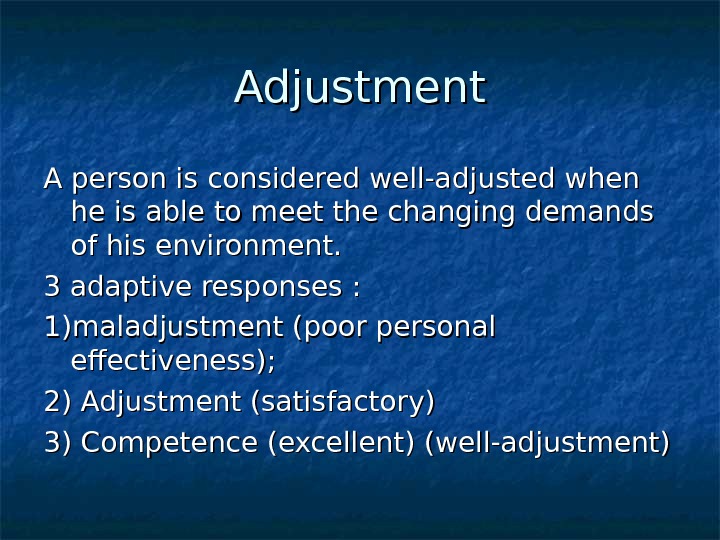
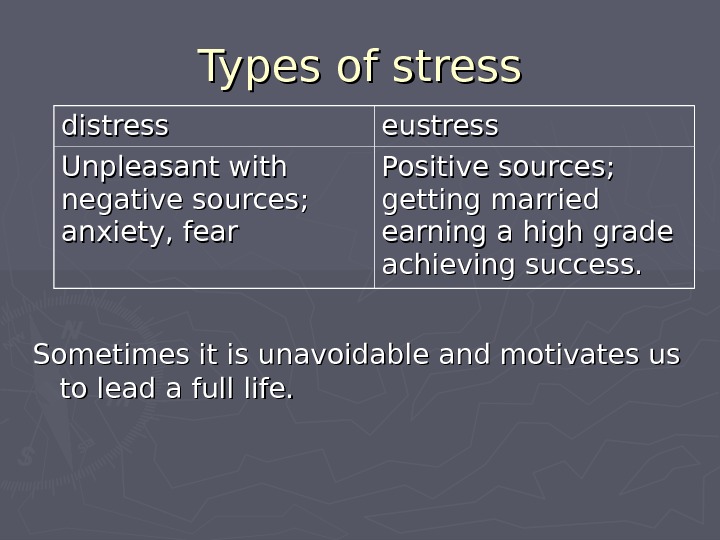

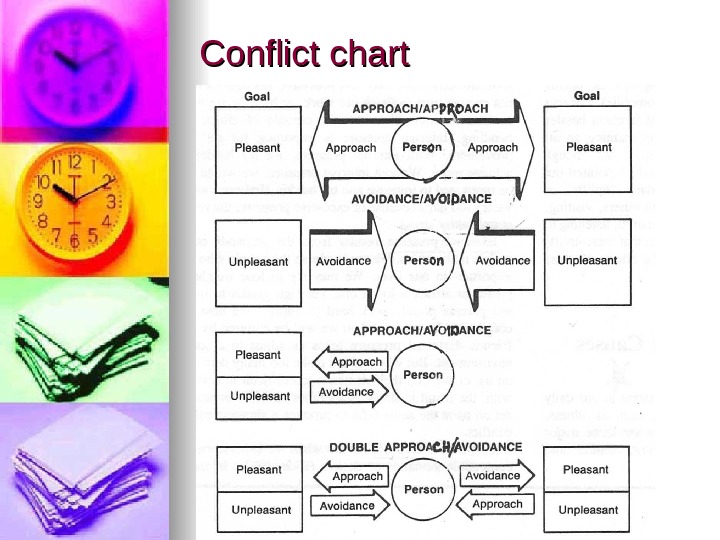
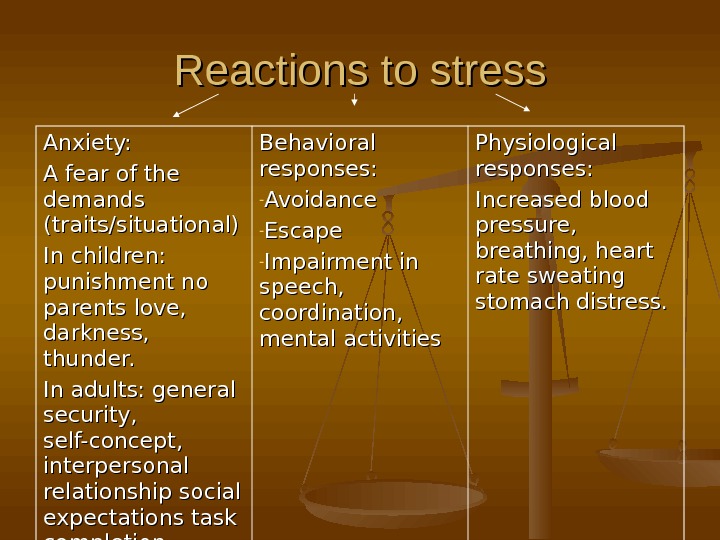
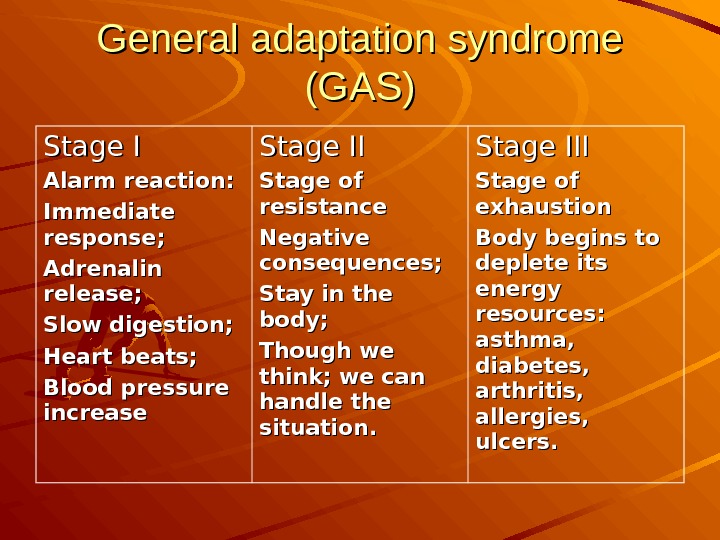
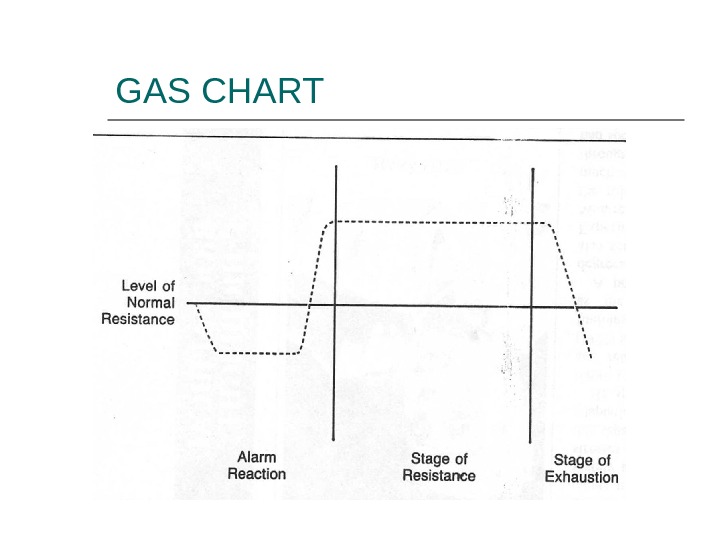
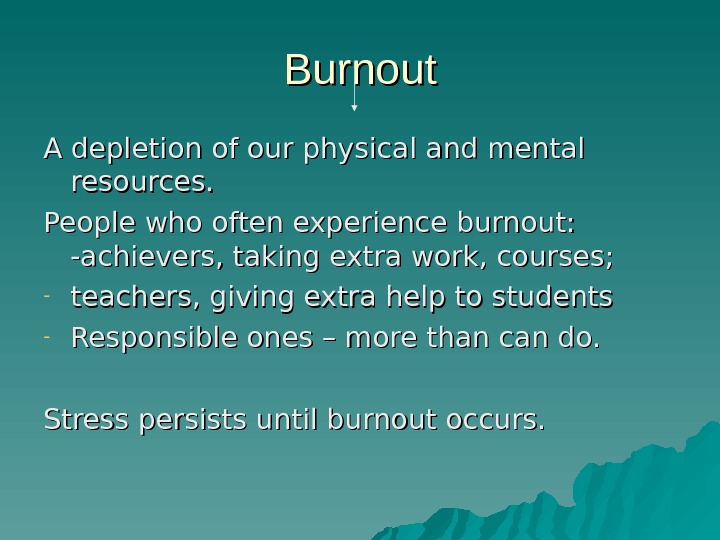
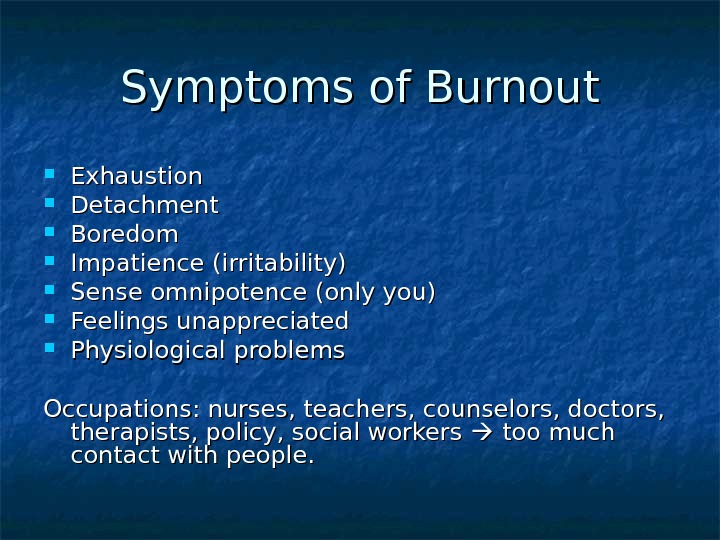
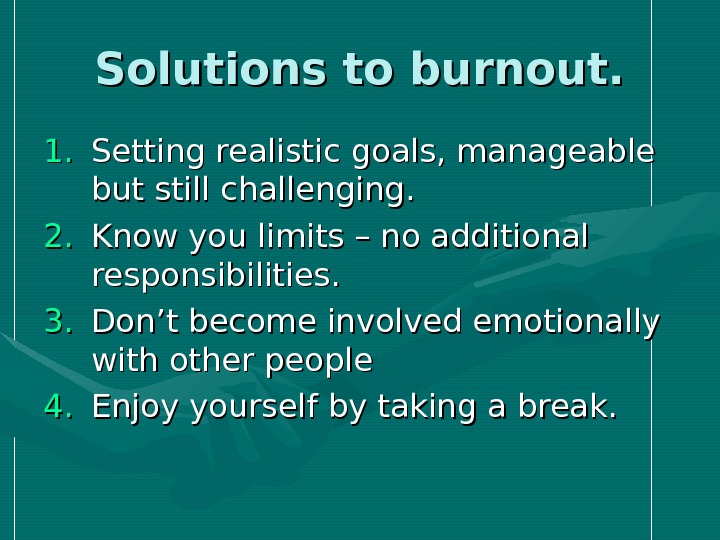
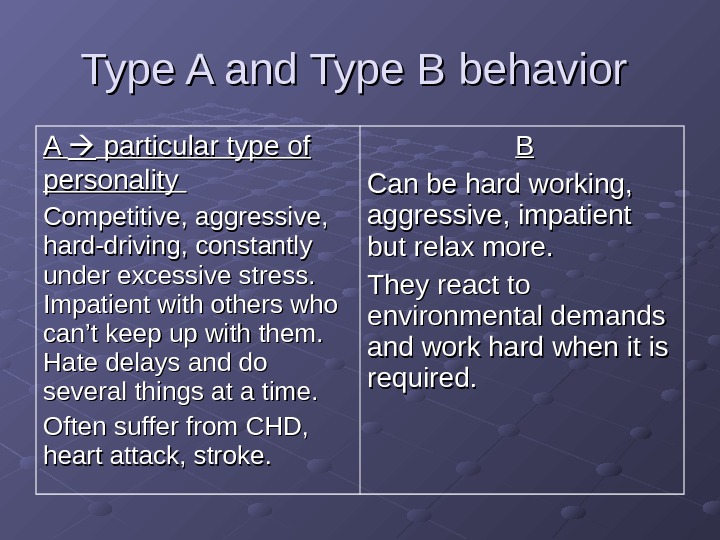
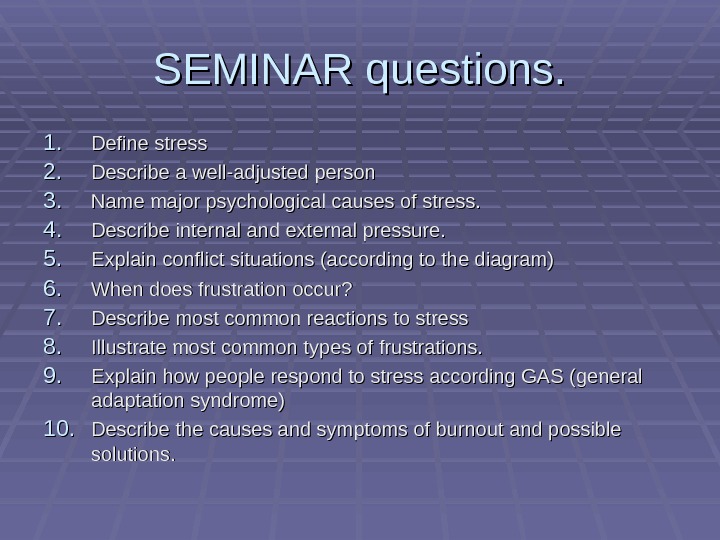
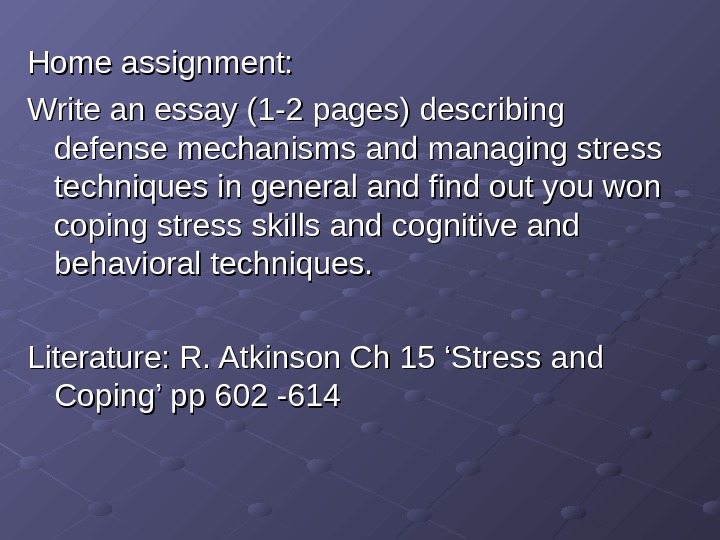
general_psychology_lecture_14-15.ppt
- Размер: 3.2 Mегабайта
- Количество слайдов: 15
Описание презентации General Psychology lectures 14 -15 Stress and adjustment. по слайдам
 General Psychology lectures 14 -15 Stress and adjustment. 1. 1. Stress and adjustment 2. 2. Causes of stress 3. 3. Reactions to stress: a. a. Anxiety b. b. General adaptation syndrome c. c. Burnout
General Psychology lectures 14 -15 Stress and adjustment. 1. 1. Stress and adjustment 2. 2. Causes of stress 3. 3. Reactions to stress: a. a. Anxiety b. b. General adaptation syndrome c. c. Burnout
 STRESS Anything that produces demands on us to adjust our behavior. It includes threats to our changes which well-being pressures require us to adjust to new situations Psychological demands: conflict and frustration. Physical demands: infection, disease, injury.
STRESS Anything that produces demands on us to adjust our behavior. It includes threats to our changes which well-being pressures require us to adjust to new situations Psychological demands: conflict and frustration. Physical demands: infection, disease, injury.
 Adjustment A person is considered well-adjusted when he is able to meet the changing demands of his environment. 3 adaptive responses : 1)maladjustment (poor personal effectiveness); 2) Adjustment (satisfactory) 3) Competence (excellent) (well-adjustment)
Adjustment A person is considered well-adjusted when he is able to meet the changing demands of his environment. 3 adaptive responses : 1)maladjustment (poor personal effectiveness); 2) Adjustment (satisfactory) 3) Competence (excellent) (well-adjustment)
 Types of stress Sometimes it is unavoidable and motivates us to lead a full life. distress eustress Unpleasant with negative sources; anxiety, fear Positive sources; getting married earning a high grade achieving success.
Types of stress Sometimes it is unavoidable and motivates us to lead a full life. distress eustress Unpleasant with negative sources; anxiety, fear Positive sources; getting married earning a high grade achieving success.
 3 major psychological causes of stress. Pressure Conflict Frustration Internal: we strive to maintain self-esteem by forcing ourselves to achieve higher standards (study harder, more popular, look attractive) It is important. External: result from the demands that other people make on us. (pleasing other people, high grades for parents, admiration from friends) It helps to adjust to social environment. 1)Approach –approach equally desirable goals that are incompatible (2 girls, 2 jobs, 2 presents) 2) avoidance-avoidance 2 2 equally undesirable demands ( test and grade) 3) Approach –avoidance single goal with positive and negative aspects. (a new car but expensive) 4) Multiple approach –avoidance we make choices away several alternatives. We are prevented from reaching a goal. Types: a)a) Time delays b)b) Daily hassles c)c) Lack of resources d)d) Losses e)e) failure
3 major psychological causes of stress. Pressure Conflict Frustration Internal: we strive to maintain self-esteem by forcing ourselves to achieve higher standards (study harder, more popular, look attractive) It is important. External: result from the demands that other people make on us. (pleasing other people, high grades for parents, admiration from friends) It helps to adjust to social environment. 1)Approach –approach equally desirable goals that are incompatible (2 girls, 2 jobs, 2 presents) 2) avoidance-avoidance 2 2 equally undesirable demands ( test and grade) 3) Approach –avoidance single goal with positive and negative aspects. (a new car but expensive) 4) Multiple approach –avoidance we make choices away several alternatives. We are prevented from reaching a goal. Types: a)a) Time delays b)b) Daily hassles c)c) Lack of resources d)d) Losses e)e) failure
 Conflict chart
Conflict chart
 Reactions to stress Anxiety: A fear of the demands (traits/situational) In children: punishment no parents love, darkness, thunder. In adults: general security, self-concept, interpersonal relationship social expectations task completion. Behavioral responses: — Avoidance — Escape — Impairment in speech, coordination, mental activities Physiological responses: Increased blood pressure, breathing, heart rate sweating stomach distress.
Reactions to stress Anxiety: A fear of the demands (traits/situational) In children: punishment no parents love, darkness, thunder. In adults: general security, self-concept, interpersonal relationship social expectations task completion. Behavioral responses: — Avoidance — Escape — Impairment in speech, coordination, mental activities Physiological responses: Increased blood pressure, breathing, heart rate sweating stomach distress.
 General adaptation syndrome (GAS) Stage I Alarm reaction: Immediate response; Adrenalin release; Slow digestion; Heart beats; Blood pressure increase Stage II Stage of resistance Negative consequences; Stay in the body; Though we think; we can handle the situation. Stage III Stage of exhaustion Body begins to deplete its energy resources: asthma, diabetes, arthritis, allergies, ulcers.
General adaptation syndrome (GAS) Stage I Alarm reaction: Immediate response; Adrenalin release; Slow digestion; Heart beats; Blood pressure increase Stage II Stage of resistance Negative consequences; Stay in the body; Though we think; we can handle the situation. Stage III Stage of exhaustion Body begins to deplete its energy resources: asthma, diabetes, arthritis, allergies, ulcers.
 GAS CHART
GAS CHART
 Burnout A depletion of our physical and mental resources. People who often experience burnout: -achievers, taking extra work, courses; — teachers, giving extra help to students — Responsible ones – more than can do. Stress persists until burnout occurs.
Burnout A depletion of our physical and mental resources. People who often experience burnout: -achievers, taking extra work, courses; — teachers, giving extra help to students — Responsible ones – more than can do. Stress persists until burnout occurs.
 Symptoms of Burnout Exhaustion Detachment Boredom Impatience (irritability) Sense omnipotence (only you) Feelings unappreciated Physiological problems Occupations: nurses, teachers, counselors, doctors, therapists, policy, social workers too much contact with people.
Symptoms of Burnout Exhaustion Detachment Boredom Impatience (irritability) Sense omnipotence (only you) Feelings unappreciated Physiological problems Occupations: nurses, teachers, counselors, doctors, therapists, policy, social workers too much contact with people.
 Solutions to burnout. 1. 1. Setting realistic goals, manageable but still challenging. 2. 2. Know you limits – no additional responsibilities. 3. 3. Don’t become involved emotionally with other people 4. 4. Enjoy yourself by taking a break.
Solutions to burnout. 1. 1. Setting realistic goals, manageable but still challenging. 2. 2. Know you limits – no additional responsibilities. 3. 3. Don’t become involved emotionally with other people 4. 4. Enjoy yourself by taking a break.
 Type A and Type B behavior A A particular type of personality Competitive, aggressive, hard-driving, constantly under excessive stress. Impatient with others who can’t keep up with them. Hate delays and do several things at a time. Often suffer from CHD, heart attack, stroke. BB Can be hard working, aggressive, impatient but relax more. They react to environmental demands and work hard when it is required.
Type A and Type B behavior A A particular type of personality Competitive, aggressive, hard-driving, constantly under excessive stress. Impatient with others who can’t keep up with them. Hate delays and do several things at a time. Often suffer from CHD, heart attack, stroke. BB Can be hard working, aggressive, impatient but relax more. They react to environmental demands and work hard when it is required.
 SEMINAR questions. 1. 1. Define stress 2. 2. Describe a well-adjusted person 3. 3. Name major psychological causes of stress. 4. 4. Describe internal and external pressure. 5. 5. Explain conflict situations (according to the diagram) 6. 6. When does frustration occur? 7. 7. Describe most common reactions to stress 8. 8. Illustrate most common types of frustrations. 9. 9. Explain how people respond to stress according GAS (general adaptation syndrome) 10. Describe the causes and symptoms of burnout and possible solutions.
SEMINAR questions. 1. 1. Define stress 2. 2. Describe a well-adjusted person 3. 3. Name major psychological causes of stress. 4. 4. Describe internal and external pressure. 5. 5. Explain conflict situations (according to the diagram) 6. 6. When does frustration occur? 7. 7. Describe most common reactions to stress 8. 8. Illustrate most common types of frustrations. 9. 9. Explain how people respond to stress according GAS (general adaptation syndrome) 10. Describe the causes and symptoms of burnout and possible solutions.
 Home assignment: Write an essay (1 -2 pages) describing defense mechanisms and managing stress techniques in general and find out you won coping stress skills and cognitive and behavioral techniques. Literature: R. Atkinson Ch 15 ‘Stress and Coping’ pp 602 —
Home assignment: Write an essay (1 -2 pages) describing defense mechanisms and managing stress techniques in general and find out you won coping stress skills and cognitive and behavioral techniques. Literature: R. Atkinson Ch 15 ‘Stress and Coping’ pp 602 —

